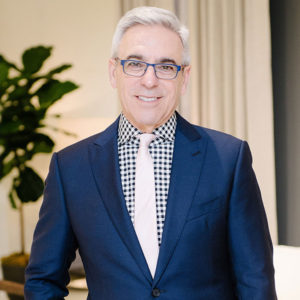Picketers at next week’s Southern Baptist Convention annual meeting in Phoenix will seek to persuade messengers and leaders to remove LGBT individuals from the “sin list” in the nation’s second-largest faith group.
Faith in America, a North Carolina-based advocacy organization, says religious messages condemning homosexuality are harmful to LGBT youth. The group, founded in 2006 by gay furniture magnate Mitchell Gold, called specifically on the SBC “to alter its course of religion-based harm to one of religion-based help” in a press release announcing a new outreach effort called “Save yOur Kids!”

Mitchell Gold
“Ultimately, we believe LGBT people should be removed from the sin list,” Faith in America leaders said in the announcement.
The three-year project will “address religious-based practices that condemn our teens and youth, creating hostile environments both at church and home, places most needed by our youth.”
“This is not about conflict and division,” said Gold, who was part of a delegation from eight LGBT advocacy groups that met with then-SBC President Bryant Wright and other denominational leaders when the convention met previously in Phoenix in 2011. “It is about speaking the truth, and standing up for our kids and teens being hurt. It is also about finding common ground around our children and youth.”
This year Faith in America will seek to engage messengers entering and leaving the meeting hall with physicians talking about the health crisis facing LGBT teens and kids and pastors of “open and affirming” churches addressing the spiritual harm of messages that condemn.
Dr. Jack Drescher, psychiatry professor at New York Medical College, said science is clear that LGBTQ youth are at risk and need help.
“People of faith unhappy about these findings may deny them, and some may even distort them,” the medical doctor said. “Unfortunately, denial and distortion of science can expose their LGBTQ children to potentially harmful practices and interventions.”
Drescher said faith communities “can be sources of great support to LGBTQ youth if they stop condemning them and begin instead to embrace these children with unconditional love.”
Studies show that if a person believes sexual orientation is a choice, they are 70 percent more likely to be against LGBT equal rights. If someone understands sexual orientation as part of how one is created, they are 70 percent more likely to be in favor of LGBT equal rights.
“The choice versus nature argument is especially significant when engaging persons who view homosexuality as a sin,” said Pastor Stan Mitchell, whose GracePointe Church in Franklin, Tenn., began welcoming LGBT members in 2015.
“Sin is about making wrong choices and actions,” said Mitchell, one of three pastors planning to join the delegation. “So the more we can get religious people to the realization that sexual orientation is an innate part of a person, a natural part of a human’s being, not a choice, that dramatically undermines the basis for viewing homosexuality as behavior-driven immorality or some perverse proclivity.”
Faith in America leaders applauded Southern Baptists for formally apologizing for sins against African-Americans in 1995 and said they anticipate similar “interpretations and new revelations” will come to light in the future prompting churches “to stop diminishing the lives of those who are LGBT.”
“We can’t deny the impact condemning religious teachings have had on people’s beliefs toward those who are LGBT,” the announcement said. “If we deny the church has had any influence, we would be kidding ourselves. This means negative as well as positive impacts must be claimed.”
Gold said the word “condemning” is used to describe the churches “that are bad players and hurt LGBT teens and kids with harsh messages that alienate, diminish and stigmatize.”
“This hurts youth and creates animosity within the hearts of parents, siblings and other kin that, in turn, also serves to abandon our youth, leaving them feeling alone in a cold world,” he said. “These teachings create bullies.”
Faith in America said kids raised in condemning religious families are eight times more likely to attempt suicide than their LGBT peers from accepting homes. Nearly half of America’s homeless youth are LGBT. More than a quarter of LGBT youth say they have been personally bullied or harassed since the 2016 presidential campaign began, compared to 14 percent of non-LGBTQ youth.
“We know Baptists care about our kids and we believe we can start a conversation and find common ground and common purpose,” the group said. “No one wants these LGBT SBC kids to feel they’d be better off dead or on the streets than with their family and community. And we would like to discuss what we might do to help ensure no child ever has to feel that way.”
In addition to engaging messengers one-on-one, the group is trying to set up a meeting with SBC officials. In 2011, Gold and other LGBT advocates had a cordial meeting with Wright, pastor of Johnson Ferry Baptist Church in Marietta, Ga., but in the end they agreed to disagree.
“Our only authority for expressing our faith is the word of God, and all through the word is sexual purity for God’s people, and that is true whether it’s homosexual sex or it’s heterosexual sex,” Wright said. “To follow Christ, it would be very difficult for us to betray our faith by ignoring what God’s word says about sexual purity.”
Other Faith in America envoys at this year’s SBC include country music singer Ty Herndon, who came out as a gay man in an interview with People magazine in 2014, and Jane Clementi, co-founder of the Tyler Clementi Foundation honoring her 18-year-old son who killed himself after cyber-bullying when he came out as openly gay in 2010.
